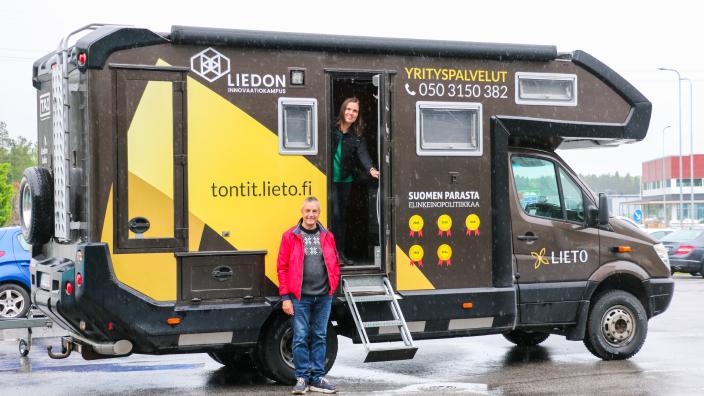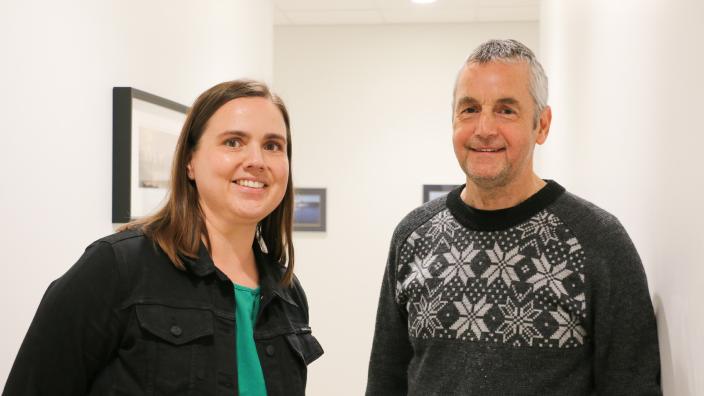Lieto believes in offering agile business services face to face. The aim is to respond quickly to entrepreneurs’ needs. The TE Service reform brought employment and recruitment services under the same umbrella.
Lieto invests in encountering entrepreneurs. Last year, the business services team provided services to some 1,800 companies. They visited more than 1,000 companies’ premises and made calls to sole entrepreneurs.
Business Services Director Mika Stepanoff tours the city’s businesses with a camper van owned by the business services. He’ll ask how the businesses are doing and if they need support or help for things like growth, investments or recruitments. He will also address any challenges and exchange ideas on overcoming them.
Stepanoff often visits entrepreneurs without making an appointment. Sometimes it ends up being just a quick hello, but often the entrepreneurs want to talk. According to Stepanoff, the most important thing is to show your face to the entrepreneurs.
“It helps them trust us and makes it easier for them to reach out and talk about things.”
Text continues after image

Even more fluent services
Since the start of this year, Lieto has also organised the city’s employment services. According to Employment Director Heidi Mansikka, it is now easier for entrepreneurs to receive employment and recruitment services as well.
The city's business and employment services cooperate closely. Business advisors communicate entrepreneurs’ employee needs to the experts at employment services. They are familiar with unemployed jobseekers’ situations and can find suitable candidates quickly.
“And if they can’t find an employee in Lieto, they can also see the situation in the rest of the employment region. It has not been possible to offer services this fluently here in Lieto before,” says Stepanoff.
Mansikka also welcomes the fact that, as a result of the employment services reform, the City of Lieto can decide independently on the appropriations for the start-up grant and pay subsidy. In the past, they would always run out in the middle of the year, but now the level of resources is good.
“I believe that decision-makers will continue along this line because these are some of the most effective employment measures.”
Bringing experts together
Stepanoff is also the Managing Director of the Lieto Innovation Campus, meant to bring together all the services that an entrepreneur might need. The network includes educational institutions in the Turku region, services by the City of Lieto, financial services, personnel service companies and entrepreneur associations.
Business services in Lieto are being developed in many ways. One project involved calling all the sole entrepreneurs in the city. The point is to help industrial companies and sole handicraft entrepreneurs find each other in the regional subcontracting network.
“We are working on a free browser-based service that lets you see the expertise available in this area. To put it simply, it’s Tinder for industry and sole entrepreneurs,” Sepanoff says.
Business services are also setting up a growth path for start-up entrepreneurs. When finished, the growth path will also support the unemployed jobseekers who are considering becoming entrepreneurs.
“We will support and contact the start-up entrepreneurs once a year for five years,” says Stepanoff.
Text continues after image

Hoping for less regulation
Heidi Mansikka is satisfied with the TE Services reform as a whole. Now, Lieto can organise employment services in a way that is as agile and human-centred as their business services.
Going forward, Mansikka and Stepanoff would continue to focus on services being agile and fluent. Two challenges they cite are the state’s inflexible IT systems and legislation that binds customer service providers too strictly.
Mansikka wants to emphasise that municipalities are highly motivated to fix employment and strengthen their vitality. Municipalities are monitoring employment and business indicators very closely.
“I’d like them to give even more responsibility to the municipal sector. For example, it would be great if the Keha Centre took on a role that supported us more and co-created with us, which it hasn’t before.”
